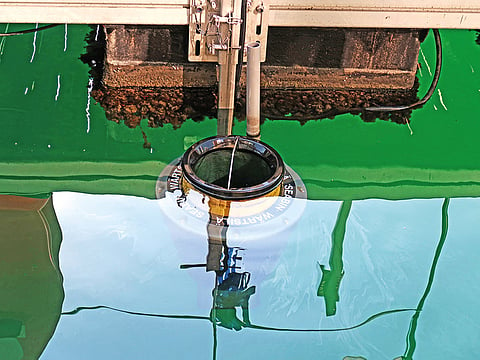Dubai Marina gets its first Seabin
Innovative rubbish bin works by trapping floating trash, oil and other micro pollutants

Dubai: Empty plastic bottles, plastics, cigarette butts, microfibres and microplastics — trash that should have gone to the landfill but landed on the marina will no longer pose a threat to marine life in Dubai thanks to the Seabin.
This innovative rubbish bin has just been installed at the Dubai Marina Yacht Club, one of the first fully-functional seabins to be installed in the Middle East.
Technology group Wärtsilä brought the Seabin to Dubai as part of its mission to install 35 Seabins in more than 25 countries.
The Seabin works by collecting floating rubbish by drawing water from the surface. Trash and debris get trapped in the catch bag while the water is pumped back into the Marina.
Apart from collecting large trash, the Seabin can also collect oils and other micro trash that are not visible to the naked eye.
“Our purpose is to enable sustainable societies with smart technology. This includes cooperating with like-minded individuals and companies, like Pete Ceglinski and the Seabin Project, to develop and implement new environmental technology,” Seppo Hautajoki, Managing Director of Wärtsilä UAE, said.
“We are proud to collaborate with the Dubai Marina Yacht Club to install one of the first-ever Seabins in the region in their waters.”
With only 35 Seabins installed in 25 countries, as many as 49 tons of marine litter or the equivalent of 10 million plastic bags will be prevented from entering our oceans just by the Wartsila Seabins alone.
Currently, there are five offshore plastic accumulation zones in the world’s oceans. The largest is called the Great Pacific Garbage Patch (GPGP) located between California and Hawaii. The GPGP is a huge pile of ocean trash spanning an estimated surface area of 1.6 million square kilometres, roughly three times the size of France.
There is also huge patch of plastic floating in the Indian Ocean and in the Atlantic Ocean. As many as 1.15 to 2.41 million tonnes of plastic are entering the ocean each year, data from The Ocean Cleanup show.
By using the Seabin, trash floating in marinas will no longer wander into the ocean to be ingested by marine life by mistake. Last month, a sperm whale washed up dead in Indonesia. Its stomach had 1,000 plastic trash including flip-flops, bottles, bags, and more than a hundred drinking cups.
The Seabins currently use low energy submersible water pumps that can utilise conventional, alternative and clean energy sources. These may include solar, wave or wind power, depending on the location and available technology.
Philip Sather, Director of Operations of the Dubai Marina Yacht Club, said the Seabin is a welcome initiative.
“The Seabin project will make a huge difference, collecting all floating rubbish, oils, fuel, debris to tackle a local problem that has global implications. We are delighted to be involved in this project that will improve the marina water quality and achieve our social responsibility goals of having a sustainable environment for the yachting community,” Sather said.



